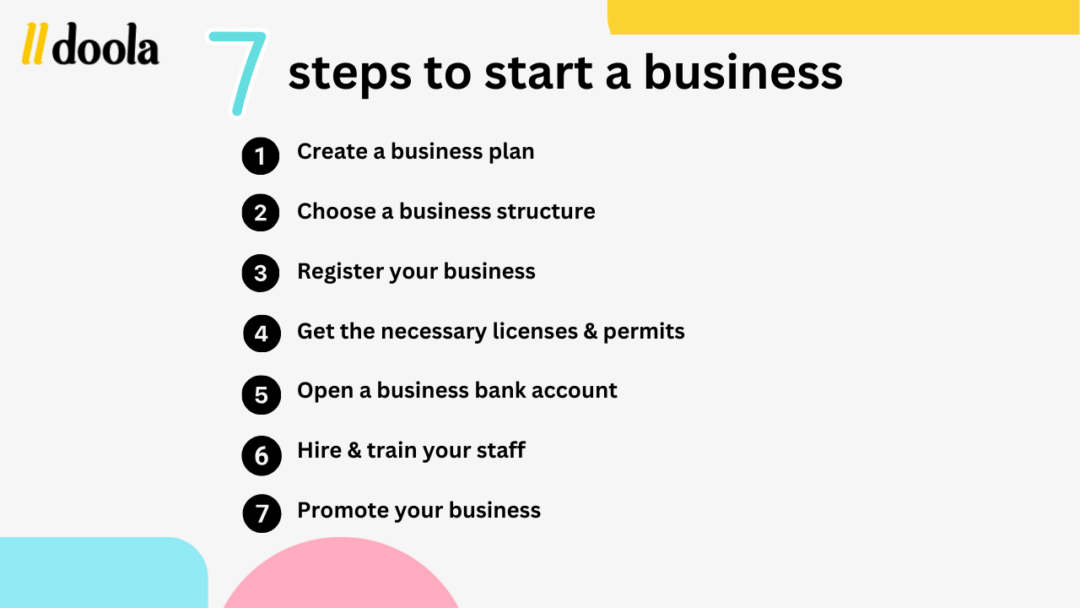Language:
45 Ideas for a Business to Start With 50k

Starting a business with just $50k is absolutely a feasible option for aspiring entrepreneurs. Even though it’s not a million, $50,000 to invest in a new business is still a great starting point.
Whether you’ve always wanted to be your own boss and run a business or have a passion project that you want to bring to life, you can make it a reality with doola’s business formation and compliance solutions.
In this guide, we’re reviewing the top 45 ideas for a business to start with 50k and how to make your entrepreneurial goals a reality.
Finding the Right Business to Start with 50k
It’s essential to have a clear idea of what type of business you want to start and how you can utilize your skills and expertise to succeed.
Before you invest your money in a new venture, you should assess your skills and expertise to ensure that you are on the right path.
Assessing your skills and expertise is necessary when starting a business with limited funds.
You need to identify what you are good at and passionate about and then look for opportunities that correspond to your skills.
You can start by brainstorming your most lucrative skills and areas of expertise.
Do you have a background in marketing, social media, or accounting?
Are you skilled in web design, content writing, or graphic design? Once you identify your strengths, you can narrow down your choices and pick a business idea that aligns with your skills and expertise.
Most importantly, try to find a business venture in a field that you enjoy. If your startup idea excites you, you’ll find it easier to dedicate yourself to your new business.
45 Businesses to Start With a $50k Investment
With $50k, you have several business opportunities that you can venture into.
We’ve compiled a list of the top 45 ideas to get your creativity flowing!
1. Food truck: Start a mobile restaurant with a unique menu.
2. Coffee shop: Open a coffeehouse that offers premium coffee, snacks, and pastries.
3. Microbrewery: Create unique craft beers and sell them in your own brewery or taproom.
4. Ice cream parlor: Serve delicious ice cream and frozen treats in your own shop.
5. Personal training studio: Start a fitness studio that offers personal training sessions.
6. Social media marketing agency: Help businesses grow their social media presence.
7. Web design agency: Offer professional web design and development services to clients.
8. Graphic design agency: Create logos, brochures, and other client design materials.
9. Digital marketing agency: Offer services like SEO, PPC, and content marketing to businesses.
10. Event planning business: Plan and organize events like weddings, corporate events, and parties.
11. Clothing boutique: Start your own fashion boutique with trendy clothes and accessories.
12. Pet grooming business: Open a pet grooming salon that offers grooming services for dogs and cats.
13. Daycare center: Open a daycare center for young children.
14. Interior design business: Help clients create beautiful and functional spaces.
15. Photography studio: Start a photography business that offers portrait, wedding, and event photography.
16. Cleaning service: Offer cleaning services to homes and businesses.
17. Lawn care business: Start a lawn care service that offers mowing, trimming, and other maintenance services.
18. Handyman service: Offer handyman services like repairs, installations, and maintenance.
19. Painting business: Start a painting service that offers interior and exterior painting.
20. House flipping business: Buy and renovate houses to sell for a profit.
21. Real estate investing: Invest in rental properties or buy and sell homes.
22. Food delivery service: Deliver food from local restaurants to customers.
23. Car detailing business: Offer car detailing services to customers.
24. Mobile car wash: Start a mobile car wash service that offers car washing and detailing.
25. Car rental business: Start a car rental business that offers rental cars to customers.
26. Tour company: Offer guided tours of popular destinations.
27. Language school: Teach foreign languages to students.
28. Tutoring service: Offer tutoring services to students in various subjects.
29. Virtual assistant business: Offer virtual assistant services to businesses and individuals.
30. Copywriting service: Offer copywriting services to businesses.
31. Translation service: Offer translation services for documents and websites.
32. Proofreading service: Offer proofreading services for documents and websites.
33. Bookkeeping service: Offer bookkeeping services to small businesses.
34. Financial planning service: Help individuals and businesses with financial planning.
35. Tax preparation service: Offer tax preparation services to individuals and businesses.
36. Freelance writing business: Start a freelance writing business and offer writing services to clients.
37. E-commerce store: Start an online store that sells products in a specific niche.
38. Dropshipping business: Start a business that uses dropshipping to sell products online.
39. Affiliate marketing business: Start a business that uses affiliate marketing to promote products and earn commissions.
40. Amazon FBA business: Start a business that uses Amazon FBA to sell products.
41. Stock trading: Invest in stocks to earn a profit.
42. Forex trading: Trade currencies on the foreign exchange market.
43. Cryptocurrency trading: Trade cryptocurrencies like Bitcoin and Ethereum.
44. Social media influencer: Build a following on social media and monetize your influence.
45. YouTube channel: Start a YouTube channel and monetize your content.
Remember, these are just brainstorming ideas. Do your research and due diligence to determine if a business idea is feasible and profitable in your specific location and market.
7 Steps to Start a Business with 50k
Starting a business is a challenging yet exciting endeavour. It requires careful planning and execution to ensure that your business will thrive and succeed in the long run. Here are the necessary steps to start a business.
1. Create a Business Plan
One of the most crucial steps in starting a business is creating a business plan. This plan will serve as a roadmap for outlining the business’s strategies and objectives.
Here is what you will need to do to create a comprehensive business plan.
Identify Your Business Concept and Target Market
Determine the nature of your business and who your target customers are. Conduct market research to gather information about your potential customers, competitors, and industry trends.
Define Your Products or Services
Clearly define the products or services that your business will offer. List down the features, benefits, and unique selling points of your products or services.
Determine Your Marketing and Sales Strategies
Outline your marketing and sales strategies to attract and retain customers. Identify the channels and tactics that you will use to reach your target market.
Create a Financial Plan
A financial plan should include a startup budget, a projected income statement, and a cash flow statement. These will help you determine your business’s financial viability and the amount of funding you will need.
Establish a Management Team
Determine the roles and responsibilities of your management team. Choose individuals with the right skills and expertise to help you run your business effectively.
2. Choose Your Business Structure
There are several different business structures you can choose from, each offering unique benefits and drawbacks. Taking the time to research each of the following will help you determine the best fit.
Sole Proprietorship
A sole proprietorship is the simplest and most common business structure. It is ideal for small businesses with one owner. The owner is solely responsible for liability and taxation. Business profits and losses are considered individual income, and the owner can deduct business expenses. However, the owner’s personal assets are at risk if the business is involved in any legal disputes.
Limited Liability Company (LLC)
Limited Liability Company (LLC) is a hybrid structure that combines the limited liability of a corporation with the simplicity and tax benefits of a partnership or sole proprietorship.
An LLC protects the personal assets of the owners from any legal disputes and has flexible taxation options.
Partnership
A partnership is a business structure in which two or more owners share responsibilities and profits. There are two types of partnerships: general and limited.
A general partnership involves an equal share of profits, liabilities, and responsibilities among the partners.
A limited partnership involves only one general partner, who has unlimited liability and controls the operations, and limited partners, who contribute capital but have limited liability.
Partnerships have the advantage of shared responsibility, but they can pose potential conflicts with partners and are subject to personal liability in case of legal disputes.
Corporation
A C-Corporation or C-Corp is a business structure that separates business operations and liability from the owners. It provides limited liability to shareholders and has the potential for unlimited growth and access to capital.
However, corporations are heavily regulated, expensive to establish, and require more paperwork and legal formalities.
3. Register Your Business
Once you’ve chosen a business structure, you must register your business with the appropriate state agency.
After registering your business, you must secure an Employer Identification Number (EIN) from the Internal Revenue Service (IRS). This will allow you to pay taxes, open a bank account, and hire employees if necessary.
You can apply for an EIN online using the IRS website.
4. Obtain Necessary Licenses and Permits
Depending on your business type, you may require additional documents like an Operating Agreement to operate legally.
Check with your state and local agencies to ensure you have everything you need to get started and that you’re not at risk of any violations.
5. Open a Business Bank Account
Opening a business bank account is an important step towards managing your finances efficiently.
Having a separate business bank account can help keep your personal and business finances separate, making it easier to track your business expenses and profits.
It can also help build credit for your business, which is important if you plan to apply for financing in the future.
To open a business bank account, you will need to provide information about your business, such as your business name, address, and EIN.
6. Hire and Train Your Staff
Having the right employees is crucial for any business to thrive. A well-developed hiring and training strategy ensures you hire the right fit for your organization.
Setting up and employee wellness and payroll management for your staff can also save you valuable time and resources. More importantly, it can enhance your business’s overall performance.
7. Promote Your Business
Promoting your business is essential to its success. There are many ways to promote your business and attract more customers, one of the best of which is digital marketing.
Digital marketing includes website content, social media marketing, search engine optimization, and email marketing.
There are also other ways to promote your business. For example, you may find direct mail campaigns work well for your business or that you have considerable success when networking.
In short, remember to test and try a variety of strategies until you find the one that sticks.
Starting Your New Business is as easy as 1-2-3 with doola
Starting a new business can be one of the most thrilling and rewarding experiences that you will ever undertake.
However, it can also be challenging and daunting, particularly if you are unsure where to begin.
But don’t worry. Make sure to explore all the small business tools and resources offered by doola.
Start your US dream business and keep it 100% compliant with doola’s repository of tools for seamless business entity formation, tax management, and financial planning.
We will help you form your business, handle your bookkeeping, file your state and federal taxes, and provide you with a dedicated account manager.
You can also book a free consultation to learn how doola can help your new venture get off the ground!
FAQs
What are some businesses I can start with 50k?
Some examples are a home cleaning service, a food truck, a personalized gift shop, a freelance consulting business, or an online store.
How do I determine which business is the best fit for me?
Consider your skills, interests, and the current market demand for your potential business. Conduct market research and create a business plan to help guide your decision-making process.
How long does it take to see a return on investment in a new business?
This depends on various factors, such as the industry, competition, and business model. It’s important to have a financial plan in place and be prepared for potential setbacks or slower growth.
What are some common mistakes to avoid when starting a new business?
Some mistakes include not conducting enough research, underestimating costs and expenses, not having a solid business plan, and not understanding the market or target audience.
How can I maximize my chances of success in a new business venture?
Network with other entrepreneurs and business professionals, stay current on industry trends, continuously learn and innovate, and prioritize exceptional customer service.
Don’t be afraid to seek guidance or advice from mentors, coaches, or consultants as needed.







